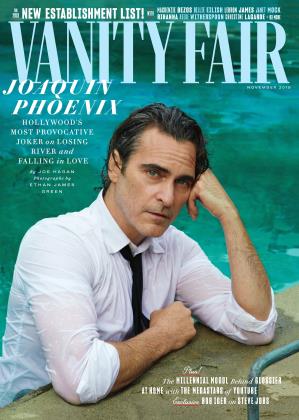Sign In to Your Account
Subscribers have complete access to the archive.
Sign In Not a Subscriber?Join NowDeath to the New Establishment (Long May They Reign!)
THE NEW ESTABLISHMENT 2019
SO MUCH FOR MAKING THE WORLD A BETTER PLACE. AFTER YEARS OF SCANDALS, OUR NEW MASTERS OF THE UNIVERSE APPEAR EVEN MORE RUTHLESS THAN THE OLD GUARD THEY DISPLACED
NICK BILTON
In San Francisco, the crown jewel of Silicon Valley, there are no poor neighborhoods, just poor people. Squeezed between million-dollar apartments and Michelin-starred restaurants is a rising tide of homelessness: vagrants begging for scraps from the tech zillionaires on Market Street, families who couldn't afford the rent after the latest IPO, Uber drivers sleeping in their cars in the Safeway parking lot. The nouveau wealth capital of America is a land of decadence and irony, where Juul (banned from selling e-cigarettes in the county) just bought a $400 million office tower and Vinod Khosla thinks he owns the beach. Farther down the 101 in Menlo Park and Sunnyvale, Facebook and Google employees are raising their kids tech-free.
This is the world the smartphone has built. In 1994, Vanity Fair inaugurated the New Establishment list to celebrate the rise of a new entrepreneurial class that promised—how young we were then!—to "make the world a better place." They were digitalage whiz kids challenging the old boy's club, rebels and hackers getting their first taste of real power. Twenty-five years later, the upstarts are now the establishment, the undisputed titans of America's second gilded age.
How quickly it all changed. Twitter, which aided the Arab Spring, now abets America's culture civil war, and its cofounder Jack Dorsey is more concerned with going on silent retreats than silencing Nazis. Mark Zuckerberg, who dreamed of bringing free internet to Africa, spends his days dodging questions about the genocide in Myanmar. Dara Khosrowshahi has righted the amoral culture of Uber but is struggling to squeeze profits from its gig-economy workforce. (For SoftBank leader Masayoshi Son, self-driving cars can't come soon enough.) Even Slack, which was going to save us from the drudgery of work, has merely insinuated drudgery deeper into the fiber of our lives.
Unwinding the problems these entrepreneurs have wrought is difficult, as anyone on the 2019 New Establishment list can attest. YouTube's Susan Wojcicki has spoken passionately of "trying to strike a balance" between removing hate speech and cultivating free expression but is quick with excuses when pressed on the specifics ("If we were to take down every video..."). Poor Zuckerberg couldn't for the life of him figure out how to rid Facebook of antivaxxers or Russian bots—at least until regulators began threatening multibillion-dollar fines and high-profile tech insiders (including Tristan Harris and Roger McNamee) began speaking publicly about breaking up the company. "Fish don't see water," one tech investor explained when I asked how Silicon Valley sees itself in this age of cultural backlash. Another senior-level tech employee, who has worked in the industry for more than a decade, wasn't so kind. "I don't think they smell their own shit," she said.
There is still a sense of wonder: Elon Musk is planning a Mars colony; Satya Nadella is pouring money into artificial intelligence; Larry Page has invested in flying cars. Wojcicki's younger sister, Anne, is building a genetic database that is already being used to design new drugs (with a $300 million investment from GlaxoSmithKline) and fuel cutting-edge academic research. Jeff Bezos has teamed up with titans of the financial industry to lower health care costs, while Brian Armstrong's cryptocurrency exchange, Coinbase, aims to disrupt the financial industry altogether. In Hollywood, technology has forced the studios to compete with Netflix and Amazon, fueling another golden age of video.
Meanwhile, venture capital is flowing outward, remaking the world for better and worse. There are start-ups growing flawless diamonds with plasma reactors, plant-based meats that "bleed" beet juice, shoes made from eucalyptus fibers. One start-up founder I recently met is growing genetically modified mushrooms that can be turned into imitation leather for belts and shoes, reducing the need for cows and helping slow climate change. (A thousand artisan villages in India won't know what hit them.) Marc Andreessen, the founder of Netscape and one half of the eponymous V.C. firm Andreessen Horowitz, used to say that "software eats the world." These days it feels more appropriate to say that " Silicon Valley eats the world"—or has eaten it already.
 View Full Issue
View Full Issue












Subscribers have complete access to the archive.
Sign In Not a Subscriber?Join Now